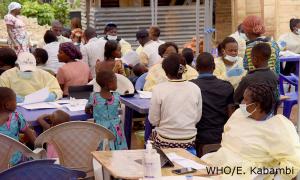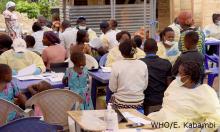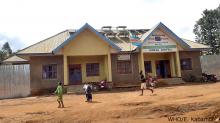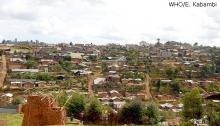Local leaders help turn the tide on Ebola
Butembo, Democratic Republic of the Congo – Joseph Kakule, the community leader of the Vighole area, has become one of the most committed social mobilizers in a region ravaged by the ongoing Ebola outbreak in the Democratic Republic of the Congo.
Kakule, 47, is a native of Butembo. He is one of the local leaders who are working to mobilize community engagement to combat Ebola. "Listening to my community, sharing its anxieties and trying to find a solution – that's what motivates me," he says.
Kakule and his deputy, 30-year-old Gervais Muhindo, form a duo resolutely determined to break the silence about the disease, and to end mistrust of Ebola health workers.
This week, they both feel happy that they have done their duty. They managed to persuade people who had come in contact with the most recent confirmed cases of Ebola to agree to be vaccinated. Located southwest of Butembo, Vighole is part of the Katwa health zone, which is considered one of the strongholds of community resistance. People here have turned a deaf ear to attempts to raise awareness of an epidemic that has continued to spread.
Every day for the past ten months, Ebola cases have been reported in Butembo – a city of more than one million inhabitants – and its immediate surroundings, including Binone, Kabondo, Kavisa, Kirimbere and Vuhunga. So far there have been more than 2 008 cases in the provinces of North Kivu and Ituri, including 1 900 confirmed and 94 probable, with more than 1 340 deaths.
To make sure that vaccination teams from the Ministry of Health and the World Health Organization could safely arrive on site to administer the Ebola vaccine, Kakule and Muhindo first toured the alleys of Vighole, meeting community members. Their goal was to conduct an in-depth door-to-door awareness campaign so that a vaccination site could be set up. They were targeting first and second degree contacts with people who had been diagnosed with the virus.
“It has been a long time since an Ebola response team could set foot here," Kakule says, “but we are mobilizing against misinformation and lack of trust within our community, which itself is plagued by doubt and anger at the insecurity caused by armed groups.”
During the first six months of 2019, the Katwa area and the Butembo urban agglomeration experienced several attacks attributed to armed groups. These attacks included the looting and destruction of Ebola treatment centres, during which some health responders at the frontline and security forces repelling the attackers lost their lives.
Kakule remembers that, after difficult weeks of bitterness and misunderstanding following these violent incidents, he and Muhindo simply decided to organize community meetings to explain that the Ebola virus disease was a serious danger that threatened everyone without exception.
"Those who die of this deadly virus are our brothers and sisters. We cannot give up and watch the situation continue to deteriorate like this without doing anything," Kakule says. The Vighole area was recently in uproar after a series of deaths occurred within a single family. First came the death of a 17-year-old boy suspected of having contracted Ebola, followed by the deaths of both his parents a few days later.
"I told myself that talking about Ebola to members of our neighbourhood is not a crime, even if other residents treat us like sell-outs bought by the response teams," says Muhindo.
Muhindo says he often uses "the testimonies of those who are already healed from Ebola as a powerful argument to sweep away the doubt" of his neighbours in the Vighole area. He also talks about the importance of vaccinating or decontaminating affected households to prevent the disease from spreading further.
Combating misinformation
Teams of first responders to the deadly Ebola virus have often faced community mistrust, fuelled by misinformation spread by some parliamentary candidates in the general elections that took place in late 2018. This is one of the reasons why Kakule and Muhindo decided to fight misinformation about the epidemic, which is having an increasingly negative impact on their community.
"We talk to everyone – young, old and even children. We tell them that it is better to get vaccinated if you came in contact with a confirmed Ebola patient rather than wait a long time to develop the disease only to die later," Kakule says.
On Friday, May 31, the response teams arrived in Vighole to begin vaccination in the field around the identified contacts. On the same day, the WHO Assistant Director-General for Emergencies and Health Risks, Dr Ibrahima Socé-Fall, visited the site and praised “the courage and commitment of these two community leaders,” referring to Kakule and Muhindo. Thanks to their hard work, their community, once resistant to response activities, is now mobilized to take ownership of the fight to get Katwa and its various neighbourhoods out of the chain of transmission of Ebola.
These response activities, coordinated by the Ministry of Health with the support of the World Health Organization and other partners, have generously received financial contributions from several donors, including Germany, the United States of America, the World Bank, the African Development Bank (AfDB), China, South Korea, the Central Emergency Response Fund (CERF), DFID, Japan, Norway, Sweden, the European Union, Canada. Gavi, The Wellcome Trust and others.






